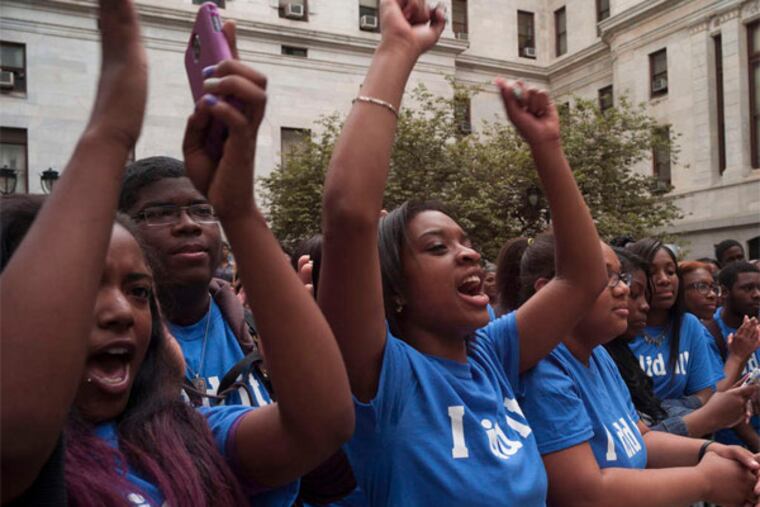Inquirer Editorial: A failure of vision
It is tempting to call the inability of city and state officials to resolve the Philadelphia schools' funding crisis a failure of leadership. But it goes beyond that.

It is tempting to call the inability of city and state officials to resolve the Philadelphia schools' funding crisis a failure of leadership. But it goes beyond that.
A number of politicians showed leadership in suggesting various solutions. But they lacked the vision to come up with a long-range plan that might forever lift the fiscal uncertainty still hanging over the district.
As is typical for this town - and the rest of the state, for that matter - most of the discussion occurred outside the public's view, as local representatives and their counterparts in Harrisburg negotiated a deal behind closed doors. But the scheme they have come up with is hardly reassuring.
Gov. Corbett has offered $15.7 million in additional basic-education funding (some of which was already budgeted by the district) plus $45 million the state once owed the federal government. City Council and the state legislature approved an extended 1-percentage-point sales-tax increase, allowing the city to borrow $50 million against it for this year. Mayor Nutter hopes the city can squeeze another $30 million out of improved tax collections.
That's only about $141 million. Superintendent William R. Hite Jr. says the projected deficit for the coming school year is $304 million. A full year of the extended sales-tax increase may yield $120 million, but that money won't be available at the start of the school year. The district has also asked employee unions for $133 million in concessions, but signs suggest that won't happen.
The legislature wouldn't approve a $2-a-pack city cigarette-tax increase, which Council passed to generate $46 million for schools. Another $22 million for schools went down the drain when Council succumbed to lobbying by restaurants and bars and failed to approve a 5-percentage-point hike in the liquor-by-the-drink tax.
None of these ideas represents the type of visionary thinking that could put to rest the schools' annual plea for more support. It's a shame that the state shortchanges not just the city schools, but most of its school districts. Philadelphia's isn't the only one scrounging for cash to balance its budget. But this city does have the ability to do more for its schools without looking to Harrisburg.
A visionary would understand that "The children are our future" can't be just a slogan. He would see that the more you invest in education, the less you will have to spend on police, prosecution, and jails. He would consider closing a city rec center or library branch and putting books, librarians, activities, recreational staff, and tutors in a school after hours and on weekends.
That's a way of thinking that may greatly upset constituencies accustomed to playing an important role in serving the public interest and receiving an appropriate share of public funding to do their good work. But with cities finding themselves less and less able to rely on state and federal funding sources, it is time for local officials to reassess how they slice the budget pie.
Schools need a bigger piece because schools need to do more. It's not enough that they educate between 8 a.m. and 3 p.m. and then sit idle. Schools should become the community centers of this city.